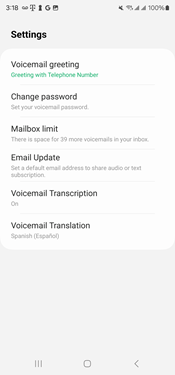
T-Mobile US, Inc. uses artificial intelligence through Amazon Transcribe and Amazon Translate to deliver voicemail in the language of their customers’ choice

provides a Voicemail to Text service to its customers, which allows customers to quickly read through their voicemails and respond to and manage messages in any order without having to dial into their voicemailbox… This service is delivered by the T-Mobile Voicemail system and uses Amazon Transcr…
This post is co-authored by Dhurjati Brahma, Senior Systems Architect at T-Mobile US, Inc and Jim Chao, Principal Engineer/Architect at T-Mobile US, Inc and Nicholas Zellerhoff Associate Systems Architect at T-Mobile US, Inc.
T-Mobile US, Inc. provides a Voicemail to Text service to its customers, which allows customers to quickly read through their voicemails and respond to and manage messages in any order without having to dial into their voicemailbox. This service is delivered by the T-Mobile Voicemail system and uses Amazon Transcribe to convert voicemail messages to text. In 2023, T-Mobile launched the Voicemail to Text Translate feature. Powered by Amazon Translate, this feature lets customers request voicemail transcriptions in their language of choice from the native Visual Voicemail application available on major Android manufacturers’ devices, beginning with flagship devices and all future devices available from major device partners.
| NATIVE VISUAL VOICEMAIL DIALER FEATURING VOICEMAIL TO TEXT TRANSLATE FEATURE – ALL MODELS | ||
 |  |  |
The history
Two years ago, in 2021, T-Mobile engineering teams partnered with AWS to launch a new AI-powered feature called Voicemail to Text with automatic language detection and to improve quality and performance for customers. Voicemail to Text provided customers with the additional benefit of receiving voicemail transcriptions at no extra cost. Voicemail to Text is available in 39 different spoken languages and dialects and uses auto-language detection provided by Amazon Transcribe. These languages included English and Spanish, as well as many European, Middle Eastern, Asian, and African languages. The full list of supported languages can be found in Amazon Transcribe documentation. Since its introduction, the usage of Voicemail to Text service has grown and it transcribes 126 million voicemail messages per month as of July 2023. T-Mobile has partnered with AWS to analyze the key application metrics of this service, such as language distribution, the number of messages per language, the daily total and unique active customers, and so on. This data helped in scaling the service and making key business decisions to improve the Voicemail to Text customer experience.
The challenge
Upon analysis of the weekly language distribution of voicemail transcriptions, T-Mobile observed that approximately 10 percent of voicemail transcriptions were received in a language other than US English, with Spanish being the predominant language.
In addition, market research based on U.S. Census Bureau data showed that approximately 22 percent of the US population spoke a language other than English. This showed a need for a Voicemail to Text translation feature that could bridge this language gap and drove T-Mobile and AWS teams to brainstorm a solution. The idea was to give T-Mobile’s Voicemail to Text customers an option to receive voicemail transcriptions in the language of their choice delivered through SMS, email, or through the Visual Voicemail (VVM) application.
The solution
T-Mobile decided to use Amazon Translate, a neural machine translation (MT) service to augment their existing Voicemail to Text service with real-time text translation between supported languages because Amazon Translate provided the high-quality translation services required in the industry. T-Mobile already had their voicemail system connected to AWS through a private AWS Direct Connect link and was using the Amazon Transcribe API to get transcriptions. Following the same design pattern, T-Mobile added an integration with the Amazon Translate API to translate voicemail transcripts from the source language detected by Amazon Transcribe to the customers’ preferred language.
Here is a high-level architecture diagram that illustrates the T-Mobile Voicemail to Text Translate solution.
From a customer perspective, to enable the Visual Voicemail Translate feature, a customer needs a Voicemail to Text feature service operator code (SOC) enabled on their mobile plan and should have one of the supported major Android manufacturer devices with the Translate feature API enabled. The customer can then visit the Visual Voicemail settings page to select a language from a list of 75 different languages and dialects supported by Amazon Translate. This will enable customers to receive voicemail transcription in the supported language of their choice.
The results
With Amazon Translate, T-Mobile was able to deliver a delightful new customer experience that accommodates the language preference of its customers and makes voicemail more accessible to people who speak various languages. This new capability helps to break language barriers by making it easier for speakers of different languages to communicate.
Conclusion
By using Amazon Transcribe and Amazon Translate language AI services, T-Mobile was able to enhance its voicemail service by delivering message transcriptions in a language that customers can understand. By choosing to use AWS managed AI services, T-Mobile was able to expedite the delivery of this new customer experience and avoid operational burdens of maintaining additional servers and software in their data centers. With Amazon Transcribe and Amazon Translate, Voicemail to Text and Voicemail to Text Translate services are delivered with low latency and high accuracy.
For more information, check out Getting started with Amazon Translate and Getting started with Amazon Transcribe to explore how you can use these services with your applications. Follow the Artificial Intelligence category on AWS Machine Learning Blog to stay up to date with new capabilities and use cases for various AWS AI services.
About the Authors
 Dhurjati Brahma is a Senior Systems Architect at T-Mobile US, Inc. He has over 15+ years of experience in designing, building, and managing robust and scalable virtualized messaging solutions within T-Mobile’s network. He is passionate to collaborate with various cross-functional teams and vendors to securely integrate T-Mobile’s messaging systems with public cloud to launch exciting new products and services for T-Mobile’s customers. He holds a Master’s degree in Electrical Engineering from University of Alabama at Birmingham. Outside of work, he enjoys going on hikes, listening to classical music, practicing meditation, and spending time with his family and friends.
Dhurjati Brahma is a Senior Systems Architect at T-Mobile US, Inc. He has over 15+ years of experience in designing, building, and managing robust and scalable virtualized messaging solutions within T-Mobile’s network. He is passionate to collaborate with various cross-functional teams and vendors to securely integrate T-Mobile’s messaging systems with public cloud to launch exciting new products and services for T-Mobile’s customers. He holds a Master’s degree in Electrical Engineering from University of Alabama at Birmingham. Outside of work, he enjoys going on hikes, listening to classical music, practicing meditation, and spending time with his family and friends.
 Jim Chao is the Principal Engineer/Architect at Core Messaging Service Design at T-Mobile US, Inc. He has more than two decades of experience in design and architecture of mobile messaging service systems and platforms. Lately, he has been dedicating his time to the next generation of messaging service using machine learning and generative AI. He holds a Master’s degree of Computer Information Systems. Outside the work he spends time with family and does a lot of religious study and practice as well as traveling to the religious places above 5000 meters in the mountains of Tibet.
Jim Chao is the Principal Engineer/Architect at Core Messaging Service Design at T-Mobile US, Inc. He has more than two decades of experience in design and architecture of mobile messaging service systems and platforms. Lately, he has been dedicating his time to the next generation of messaging service using machine learning and generative AI. He holds a Master’s degree of Computer Information Systems. Outside the work he spends time with family and does a lot of religious study and practice as well as traveling to the religious places above 5000 meters in the mountains of Tibet.
 Nicholas Zellerhoff is an Associate Systems Architect for T-Mobile as part of the Service Technology Development team functioning as lead development engineer for Native Visual Voicemail services. When not in office, Nick enjoys everything outdoors, from backyard BBQs with friends to backcountry hiking in the North Cascades.
Nicholas Zellerhoff is an Associate Systems Architect for T-Mobile as part of the Service Technology Development team functioning as lead development engineer for Native Visual Voicemail services. When not in office, Nick enjoys everything outdoors, from backyard BBQs with friends to backcountry hiking in the North Cascades.
 Alex Bulatkin is a solutions architect at AWS. He enjoys helping communication service providers build innovative solutions in AWS that are redefining the telecom industry. He is passionate about working with customers on bringing the power of AWS AI services into their applications. Alex is based in the Denver metropolitan area and likes to hike, ski, and snowboard.
Alex Bulatkin is a solutions architect at AWS. He enjoys helping communication service providers build innovative solutions in AWS that are redefining the telecom industry. He is passionate about working with customers on bringing the power of AWS AI services into their applications. Alex is based in the Denver metropolitan area and likes to hike, ski, and snowboard.
 Prabhakaran Balasubramaniam is a Principal Customer Solutions Manager at AWS. He loves to help telecom customers leverage new technologies to solve their problems. Prabhakaran is based in the Dallas-Fort Worth area and likes sports.
Prabhakaran Balasubramaniam is a Principal Customer Solutions Manager at AWS. He loves to help telecom customers leverage new technologies to solve their problems. Prabhakaran is based in the Dallas-Fort Worth area and likes sports.
Author: Dhurjati Brahma



